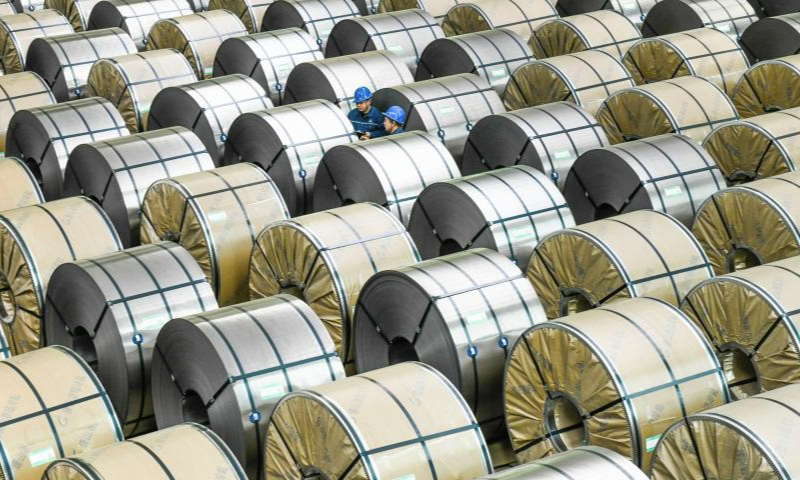
Staff members work at a warehouse of Ganglu Iron & Steel Co., Ltd. in Tangshan, north China's Hebei Province, May 1, 2024. International Workers' Day is observed annually on May 1. (Photo by Liu Mancang/Xinhua)
Chinese experts on Thursday slammed India's plan to impose tariffs on some steel products imported from China, noting the move will backfire and further damage China-India economic and trade relations. They also urged the Indian side to take a correct approach to its cooperation with China, as the two countries' trade has strong complementarity.
According to Reuters, India will impose tariffs of 12 percent to 30 percent on some steel products imported from China and Vietnam in a bid to safeguard and boost the local industry, an Indian finance ministry order showed on Tuesday.
Welded stainless steel pipes and tubes from China, the world's largest producer of steel, and Vietnam will be taxed for the next five years, according to the order.
"India's move is intended to implement import substitution. The country hopes that with the improvement of its own technology, India's industry can achieve the replacement of Chinese products through trade protection measures, so as to develop the so-called Make in India initiative," Liu Zongyi, secretary-general of the Research Center for China-South Asia Cooperation at the Shanghai Institutes for International Studies, told the Global Times on Thursday.
However, raising tariffs doesn't guarantee that these products will flourish in India, Liu noted.
"The plan to impose tariffs... could adversely affect China-India economic and trade relations and have a long-term negative impact on India's industrial development, as raising import tariffs may increase production costs," Wang Peng, an associate research fellow at the Beijing Academy of Social Sciences, told the Global Times on Thursday.
Despite India's previous targeted crackdowns against Chinese companies since the conflicts between China and India in June 2020, China-India trade has shown overall upward momentum in the past three years, data from Chinese customs showed.
"The nature of China-India economic and trade relations is complementary. India mostly imports intermediate products from China, and after further processing or assembling, it then exports them to other countries and regions," Liu said, noting that by avoiding Chinese companies and trade with China, India's exports would be worse off.
Global Times




